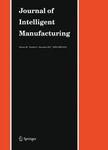版权所有:内蒙古大学图书馆 技术提供:维普资讯• 智图
内蒙古自治区呼和浩特市赛罕区大学西街235号 邮编: 010021

作者机构:Chinese Acad Sci Inst Automat Beijing 100190 Peoples R China Univ Chinese Acad Sci Beijing 100049 Peoples R China
出 版 物:《JOURNAL OF INTELLIGENT MANUFACTURING》 (智能化制造业杂志)
年 卷 期:2020年第31卷第4期
页 面:833-845页
核心收录:
学科分类:08[工学] 0802[工学-机械工程] 0812[工学-计算机科学与技术(可授工学、理学学位)]
基 金:Intelligent Manufacturing Comprehensive Standardization National Natural Science Foundation of China, NSFC, (U1701262, U1801263) Ministry of Industry and Information Technology of the People's Republic of China, MIIT
主 题:Multi-source data fusion Imbalanced learning Convolutional auto-encoder Generative adversarial networks Inconsistent lithium-ion cell screening
摘 要:Because the data generated in the complex industrial manufacturing processes is multi-sourced and heterogeneous, it brings a challenge for addressing decision-making optimization problems embedded in the whole manufacturing processes. Especially, for inconsistent lithium-ion cell screening as such a special problem, it is a tough issue to fuse data from multiple sources in a lithium-ion cell manufacturing process to screen cells for relieving the inconsistency among cells in a battery pack with multiple cells configured in series, parallel, and series-parallel. This paper proposes a data-driven decision-making optimization approach (DDDMO) for inconsistent lithium-ion cell screening, which takes into account three dynamic characteristic curves of cells, thus ensuring that the screened cells have consistent electrochemical characteristics. The DDDMO method uses the convolutional auto-encoder to extract features from different characteristics curves of lithium-ion cells through multi-channels and then the features in different channels are combined into fusion features to build a feature base. It also proposes an effective sample generation approach for imbalanced learning using the conditional generative adversarial networks to enhance the feature base, thereby efficiently training a classifier for inconsistent lithium-ion cell screening. Finally, industrial applications verify the effectiveness of the proposed approach. The results show that the missing rate of inconsistent lithium-ion cells drops by an average of 93.74% compared to the screening performance in the single dynamic characteristic of cells, and the DDDMO approach has greater accuracy for screening cells at lower time costs than the existing methods.